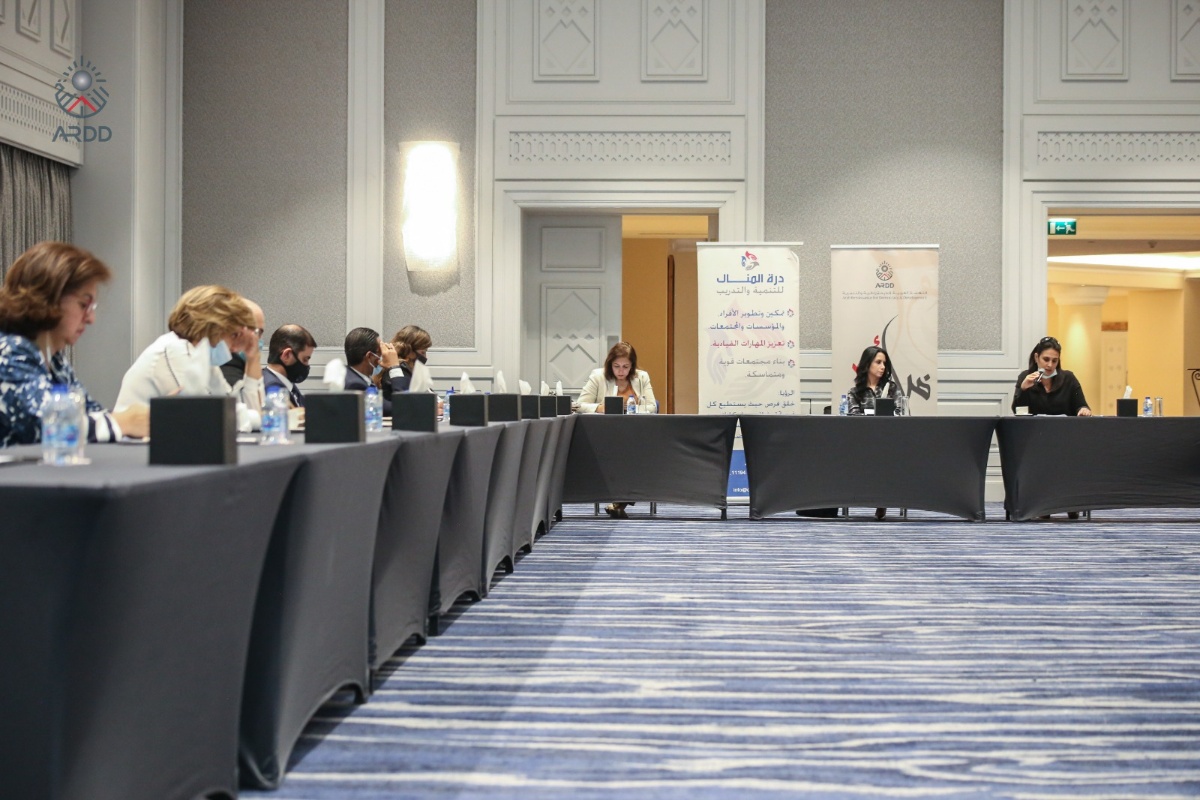Dr. Sawsan Almajali, founding partner of the Durrat Almanal for Development and Training, drew attention to the fact that the government’s defense laws, issued during the Corona pandemic in an attempt to stop its spread, “affected the work flow of the justice sector due to disruptions to courts and lawyers and difficulty in moving around, which impeded or delayed access to justice”. The statement was made on October 18, 2020, during the third meeting of the Steering Committee of the Forum for Supporting the Development of the Justice Sector in Jordan, which was organized by Durrat AlManal in partnership with the Arab Renaissance for Democracy and Development (ARDD) under the title “The impact of the Coronavirus pandemic on the justice sector in Jordan”.
Representatives of civil society organizations, private sector and media, as well as activists, notables, lawyers and former ministers took part in the meeting that dealt with the impact government measures have had on access to justice, litigation and redress, as well as on vulnerable groups like day laborers, migrant workers, children and women, including their access to justice. The participants also discussed activating electronic litigation.
Ms. Linda Al Kalash, CEO of Tamkeen Center, referred to the reports released by the center, which monitored the situation of workers in light of the closures and lockdowns. She mentioned the difficulties faced by workers, including violations regarding their wages, the performance of home-based female workers, who often had to stop working of women who were forced by their employers to work despite the lockdown, and of the high price for transportation many of them incurred during the pandemic. Referring to expatriate domestic and agricultural workers, she mentioned the impossibility to access electronic e-wallets and platforms launched by the government to deal with the pandemic, and the inadequate educational and cultural level of migrant workers, including their languages, which led to some of them being exploited by their employers or deported without receiving their financial dues. Kalash also talked about human trafficking cases and how they were affected: “Victims of human trafficking have been affected by the closure of the Dignity shelter, and when they sought refuge in the Women’s Union shelter, they were asked to undergo the Corona analysis and bear the high cost of it.”
Regarding children’s access to justice during the Corona pandemic, media and child-related activist Nadine Al-Nimri, talked about the most important difficulties faced by children during lockdowns, which include increased vulnerability to domestic violence due to the closure of schools and, in some cases, being forced by parents to beg and work. Al-Nimri also stressed that the lockdowns made it more difficult for children to access the justice system, adding that “44 juveniles were arrested for violating defense laws, which violates the Juveniles Act, which requires that children not be arrested for a violation or a misdemeanour, and some of them were asked to pay a full fine or half a fine for their release, which is not provided in the law”.
Al-Nimri also tackled the issue of disabled children, and the challenges they face, of children who were denied the right to care and have their cases followed up by their mentors, as well as of the suffering of the students under the current situation, the lack of basic education, the replacement of the non-interactive platform Darsak, the lack of mentoring classes, and the inability of students to interact with their teachers, with the exception of some private schools.
Regarding the legal sector, ARDD CEO Samar Muhareb stressed the need for the government to ensure that the rule of law prevails, notwithstanding crises. Muhareb reviewed the measures taken by the government and their impact on the legal sector, and its response to the civil society’s demand to postpone certain cases for two months, activate cases remotely, and grant judges and lawyers permission to move freely.
She also emphasized the need for partnerships among all sectors, and especially the government and civil society, in order to ensure that all groups of society have access to justice, adding : “It is important to integrate services among various state agencies, such as the Ministry of Justice, the Ministry of Interior, the Ministry of Labor and others.”
Muhareb said that ARDD provided legal advice over the phone in more than 7,000 cases, including complaints and consultations concerning refugees, expatriates and host communities, stressing that observing the rule of law is even more imperative during crises and that it is important to ensure the effectiveness of the justice system and the ability of people to access it at all times. Due to the difficult economic conditions and the problems in the labor sector, the demand for legal aid services will increase, or there will be reluctance to litigate and loss of rights, especially by the most vulnerable groups, like women, day laborers, refugees and migrants.
The attendees discussed the challenges and opportunities presented by remote litigation and emphasized the importance of developing mechanisms to ensure electronic access to justice of a wide sector of the population.
The speakers stressed the importance of working in a participatory manner to ensure the rule of law, of legal empowerment and protection in emergency and crisis situations, and the need for the different sectors of society to collaborate in these matters to ensure resilience and help the process of post-pandemic recovery.


